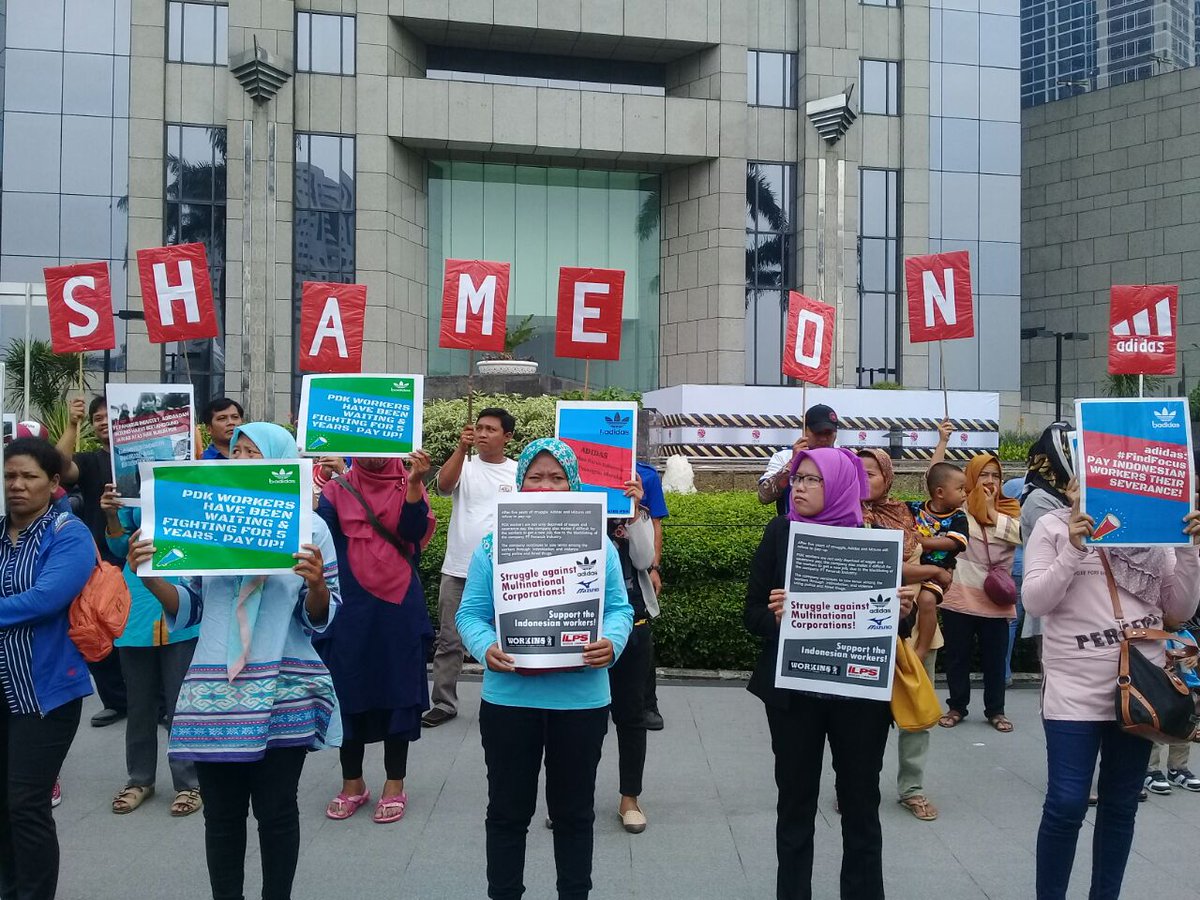
Top global sports brands adidas and Mizuno shamefully defy international standards on workers’ rights in Indonesia
Clean Clothes Campaign issues the following statement in response to the refusal of adidas and Mizuno to pay what is owed to workers who made their shoes in Indonesia:
Sports’ brands adidas and Mizuno, as major buyers to the Panarub Dwikarya Benoa (PDK) factory in Indonesia in 2012, should finally ensure that 345 former workers receive the severance payments they are rightfully owed. In continuing to refuse to take responsibility adidas and Mizuno are directly violating international human rights norms and standards.
The international standards could not be clearer. The UN Guiding Principles on Business and Human Rights state that it is the responsibility of international operating companies to ensure that human rights are respected in their supply chains, through active prevention and mitigation of adverse human rights impacts. This responsibility is independent of the actions of states and even applies if the company’s contribution to the impact was indirect. The long-standing relationship between adidas and Mizuno as leading buyers of the PDK factory, as well as the group the factory belongs to, is an indisputable fact. Both brands therefore had a clear responsibility to prevent, address, and mitigate the labour situation at the PDK factory well before and after the strike in July 2012.
For years prior to the 2012 strike, the workers at the PDK factory, most of them women, experienced abusive and unlawful working conditions. Some women only earned $0.60 an hour, far below the minimum wage in Indonesia. In January 2012, to ensure that increased production targets of hundreds of shoes an hour were met, factory management intensified the verbal and physical abuse against the women workers and deprived them of time to eat, drink water or go to the toilet. In February 2012, the workers decided to form a new union to address these issues.
In July 2012 the PDK workers decided to protest the poor working conditions and low wages by going on strike, an unequivocal right under international human rights norms. The striking workers were first met with police violence and management intimidation, and eventually 1300 workers were fired. All of the incidents described clearly violate a vast array of international human rights principles and this was affirmed in a 2016 ILO report. Therefore, it bears repeating, both adidas and Mizuno have an unmitigated and unequivocal responsibility to ensure that the workers receive just remedy and this responsibility will not be met until the 345 workers who are still fighting for justice receive the compensation that they are owed.
The fact that adidas may have severed their relationship with the PDK factory at the time of the strike is both irrelevant and troubling in itself. Adidas shoes were produced at the factory until at least May 2012. Therefore adidas was present at the factory during the many years of wage and labour rights’ violations, which eventually gave rise to the workers’ strike. As a consistent major buyer to the factory group that owned the PDK factory, adidas had the knowledge and means to use significant leverage to change the situation at the PDK factory before the strike and then later even after having ended the relationship.
Further, in the face of human rights violations in supply chains, it is essential for brands to stay and work to fix the problems in garment factories rather than leave. The ‘race to the bottom’ business strategy in the garment industry is characterized by unequal and insecure relationships between global buyers and local suppliers, which incentivizes factories to cut corners to remain competitive. Instead of building a sustainable relationship in which labour rights’ violations could have been addressed, adidas did absolutely nothing to help the workers which could have helped to prevent the strike. In this particular case adidas is relying on their cut and run strategy as a defense, a strategy that likely gave rise to the abusive conditions at the factory in the first place.
Mizuno and adidas’ actions in relation to the former PDK workers remain woefully inadequate. It has become increasingly clear that these brands are biding time waiting for the workers to give up their fight and for the international community to lose interest. They are playing the blame game instead of admitting that these workers in their supply chain have been wronged and that those who profit most from these workers’ labour should take the eventual responsibility. Their inaction is inexplicable given that the combined yearly earnings of these two global brands well surpasses a billion dollars.
The 345 ex-PDK factory workers continue to pay the price every day. Some of them were placed on a black list, making it impossible to find permanent employment. Workers’ children had to leave school and other families became homeless, no longer able to afford rent.
The UN Forum on Business and Human Rights, taking place in November 2017, will address the central theme of “Realizing access to effective remedy”. The former PDK workers are an excellent example of the fact that such access is not self-evident and often absent. Clean Clothes Campaign remains committed to continue to support these workers in their campaign for justice.
Find adidas' earlier refusal here.